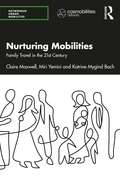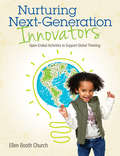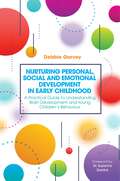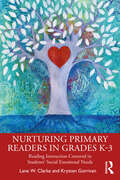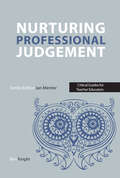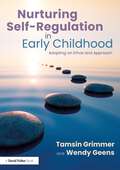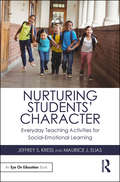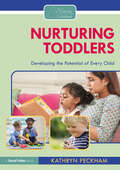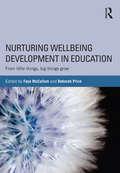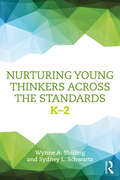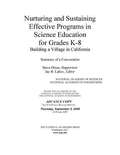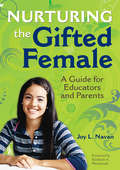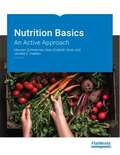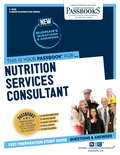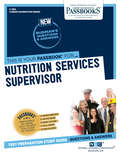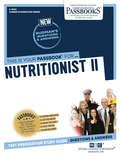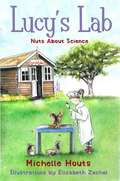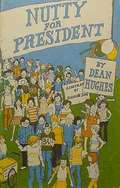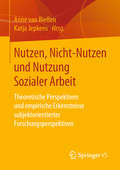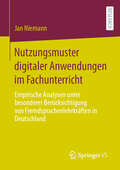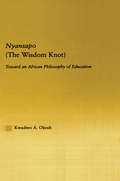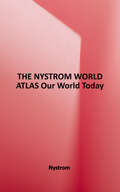- Table View
- List View
Nurturing Mobilities: Family Travel in the 21st Century (Networked Urban Mobilities)
by Claire Maxwell Miri Yemini Katrine Mygind BachNurturing Mobilities employs new empirical material and an innovative theoretical framing to bring new clarity to why families travel today – and what happens when they do. The authors argue that an imperative to ‘think with mobility’ and to ‘aspire to be mobile’ shapes identities, futures, and family practices. Drawing on data that examines family travel practices – typically short-term trips – across the working-, middle-, and globally mobile middle-classes, Nurturing Mobilities describes how families travel, why they travel, and the role young family members play in curating family travel. Vitally, it examines the two biggest contemporary issues in global mobility: COVID-19, and climate change. How has COVID-19 changed travel motivations in a world beset by lockdowns and diminished finances? How are concerns around climate change, and engagements with global citizenship education, changing family travel practices? Nurturing Mobilities illuminates new ways in which social class divergence is forged through movements across borders. The authors’ theoretically inter-disciplinary approach delivers a full analysis of the apparently divergent processes that differentiate family travel along social class lines, yet also allow travel to play a core role in social mobility. This book is a vital resource for scholars and students studying mobility, globalisation, social class, and climate change engagement.
Nurturing Next-Generation Innovators: Open-Ended Activities to Support Global Thinking
by Ellen Booth ChurchChildren need a broad view of the world to better work with others and achieve academic success. That means being able to see many perspectives, listen to others, and share their own ideas and perceptions. Nurturing Next-Generation Innovators aims to prepare the next generation of global citizens with simple activities that start with identifying different perspectives and then challenge them to notice what they perceive. The themes in Nurturing Next-Generation Innovators are meant to ask children to notice relationships, investigate same and different, use perceptions to develop inductive and deductive reasoning, and evaluate their processes and thinking. All of this in the context of fun songs, games and activities. This book is organized differently than the traditional activity book, which is divided into sections by skill or curriculum area. Instead, it is divided into four major themes that walk children through increasing understandings of their place in the world. Literacy, math, science, motor skills, and social skills are woven into each theme. - See more at: https://www.gryphonhouse.com/books/details/nurturing-next-generation-innovators#sthash.sRzH0ClQ.dpuf
Nurturing Personal, Social and Emotional Development in Early Childhood: A Practical Guide to Understanding Brain Development and Young Children’s Behaviour
by Debbie Garvey Dr Suzanne ZeedykThis direct guide supports practitioners in nurturing personal, social and emotional development (PSED) in young children by demystifying brain development research. Condensing a wealth of recent research and theory around PSED into practical guidance, it gives professionals the knowledge and understanding they need to critically evaluate their own practice and find the best course of action to support PSED in young children. From the perspective of neuroscience, it explores what can help or hinder development, considers why some children bite and why toddlers have tantrums, and questions how well-intentioned actions, such as reward systems or putting new foods on a plate for children to 'just try', may be misguided.
Nurturing Primary Readers in Grades K-3: Reading Instruction Centered in Students' Social Emotional Needs
by Lane W. Clarke Krysten GorrivanWeaving together reading pedagogy and social emotional learning (SEL) frameworks, this text presents an integrated, research-based approach to reading instruction grounded in instructional and collaborative strategies that address students’ social emotional needs. The text features real stories from the classroom to invite readers to learn alongside the students, teachers, families, and professionals as they experience journeys of growth. The authentic case studies cover best practices in reading instruction in a way that centers students, promotes the whole child, and supports reading growth. Following a cyclical framework – discovering, nurturing, growing – each chapter addresses typical student reading needs and explains the role of collaborative relationships in effective instruction. Through the medium of storytelling, readers gain profound insights into key topics, including teaching multilingual students, phonological awareness, reading fluency, and more. Accessible and comprehensive, this book steers away from a prescriptive recipe for instruction but rather leaves readers with an effective framework for incorporating data-based decision-making, collaboration, and research-supported literacy practices to foster each student's social and emotional skills in the classroom. With a targeted focus on K-3 classrooms, this text is a key resource for pre-service and in-service educators in literacy education and elementary education, enriching the perspectives of all educators.
Nurturing Professional Judgement (Critical Guides for Teacher Educators)
by Ben KnightIn-the-moment dilemmas and situational awareness are central to teachers' work, but these concepts may not always find their way into teacher education - as they often get pushed aside in favour of curriculum coverage and compliance agendas. This book challenges a technicist and mechanistic view of teaching and learning to examine how teacher educators might best prepare soon-to-be teachers to make sound professional judgements in their classroom practice. It discusses evidence in the literature that teaching does not directly 'produce' learning and that nurturing learning is a complex business which relies on both 'art and science'. Current policies and compliancy agendas influencing the content of ITE programmes are analysed, and the text provides practical suggestions for how to nurture professional judgement in trainee teachers through HE provision and school-based mentoring. It describes the dynamism of those who teach in classrooms and reminds teacher educators of the value and necessity of managing structure and improvisation, protocol and intuition which are at the heart of what it means to be a professional. A new addition to our Critical Guides for Teacher Educators series.
Nurturing Self-Regulation in Early Childhood: Adopting an Ethos and Approach
by Tamsin Grimmer Wendy GeensNurturing Self-Regulation in Early Childhood explores how young children develop self-regulation and offers practical guidance on helping them to manage their feelings and behaviour. It considers the skills, attitudes and dispositions children need to be able to self-regulate and how their wellbeing and self-esteem can affect their ability to do this. Grimmer and Geens show how schools and settings can adopt an ethos where self-regulation permeates their whole provision. Considering the broad and multifaceted nature of self-regulation and how this key area of development shapes children and their learning, the chapters cover: developing empathy emotion coaching the practitioner as a co-regulator executive function and the sense of self and wellbeing international approaches to promoting self-regulation the role of the adult and environment in encouraging skills for self-regulation working effectively with parents and carers to ensure a consistent approach With a focus on developmentally appropriate expectations, this book is essential reading for all early childhood educators who want to develop their understanding of self-regulation and embrace an approach that underpins their practice and changes children’s lives.
Nurturing Students' Character: Everyday Teaching Activities for Social-Emotional Learning
by Maurice J. Elias Jeffrey S. KressNurturing Students’ Character is an easy-to-use guide to incorporating social-emotional and character development (SECD) into your teaching practice. The links are clear—elementary and middle school students have better odds of academic success if you nurture their social and emotional skills. Drawing on broad field experience and the latest research, this book offers intuitive techniques for infusing your everyday teaching and classroom management with SECD opportunities. With topics ranging from self-regulation and problem solving to peer communication and empathy, these concrete strategies, practical worksheets, and self-reflective activities will help you foster a positive classroom culture.
Nurturing Toddlers: Developing the Potential of Every Child
by Kathryn PeckhamChildren undergo tremendous physical growth and cognitive development during their toddler years. Nurturing Toddlers explores the knowledge behind how a child’s mind and body develop during this stage of development, underpinned by the latest research in the fields of child development, psychology, health and well-being. It shows how the choices practitioners and parents make every day can have a deep impact on children’s experiences and the practices that can be embedded straight away to support their ongoing development and give them the best opportunities for future success.The book follows a holistic approach through the Nurturing Childhoods Pedagogical Framework, tailored for toddlers gaining greater mobility and autonomy, as we learn to understand children's evolving capabilities through their engagement in core behaviours and use these to unlock their full potential. Chapters cover: Connecting with toddlers and the importance of communication, movement and play Big emotions and the behaviours they can trigger The secret to effective praise and encouragement Nurturing self-esteem Establishing foundations for a love of reading Supporting toddlers as they begin doing things for themselves Nurturing intrinsic motivations, self-esteem and prioritising positive reinforcement Part of the Nurturing Childhoods series, this exciting book provides practitioners and parents with the knowledge and understanding they need to nurture toddlers' happiness, well-being and sense of security as they go through this rapid period of transformation.
Nurturing Wellbeing Development in Education: From little things, big things grow
by Deborah Price Faye McCallumAt the core of education, the notion of wellbeing permeates both learner and teacher wellbeing. This book explores the central role and responsibility of education in ensuring the wellbeing of children and young people. Through the employment of vignettes, proactive educational wellbeing initiatives are provided to address issues pertaining to learner and teacher wellbeing, mainstream classrooms, educational marginalisation, disabilities, cyber citizens, initial teacher education and rural education. Through employing diverging theoretical approaches of; expectancy x value theory; ecological systems theory and community practices across digital imagery; case studies; questionnaires and survey methodology, the key message of the centrality of wellbeing to educational success pervades. This book provides a critical engagement with the educational discourse of wellbeing, whilst addressing issues impacting on wellbeing with worldwide implications. It offers a unique insight into both learner and teacher wellbeing and how education can contribute to enhancing wellbeing outcomes for society in general.
Nurturing Young Thinkers Across the Standards: K–2
by Wynne A. Shilling Sydney L. SchwartzNurturing Young Thinkers Across the Standards: K–2 provides multiple practical resources to assist teachers in working with standards across subject areas in ways that bring critical thinking into the everyday process of learning content and skills. The authors provide suggestions for engaging and sustaining children’s interest and illustrate the use of teaching language that actively nurtures the habits of lifelong learning. The book is rich with opportunities for developing tools for design, implementation, and assessment of vibrant integrated curricula for K–2 students that support the development of cognitive skills and increase confidence in their abilities to think and learn.
Nurturing and Sustaining Effective Programs in Science Education for Grades K-8: Building a Village in California
by National Academy Of Sciences National Academy of Engineering of the National AcademiesK-8 science education in California (as in many other parts of the country) is in a state of crisis. K-8 students in California spend too little time studying science, many of their teachers are not well prepared in the subject, and the support system for science instruction has deteriorated. A proliferation of overly detailed standards and poorly conceived assessments has trivialized science education. And all these problems are likely to intensify: an ongoing fiscal crisis in the state threatens further cutbacks, teacher and administrator layoffs, and less money for professional development. A convocation held on April 29-30, 2009, sought to confront the crisis in California science education, particularly at the kindergarten through eighth grade level. The convocation, summarized in this volume, brought together key stakeholders in the science education system to enable and facilitate an exploration of ways to more effectively, efficiently, and collectively support, sustain, and communicate across the state concerning promising research and practices in K-8 science education and how such programs can be nurtured by communities of stakeholders.
Nurturing the Gifted Female: A Guide for Educators and Parents
by Joy NavanStrengthen gifted girls' potential by exploring characteristics of girls' giftedness; factors affecting development; issues of resilience, self-efficacy, and personal ethics; and the importance of supportive adults.
Nutrition Basics: An Active Approach Version 3.0
by Maureen Zimmerman Mary Elizabeth Snow and Jennifer K. FredianiWhen purchased from FlatWorld (the publisher), this Color Print Textbook includes Online Access, Quizzes, and Homework (if professor uses Homework system). Online textbook is accessible. Nutrition An Active Approach is suitable for courses called Introduction to Nutrition, Personal Nutrition, or similar titles that cover basic information about food, food choices, and health. This course is generally taught at the undergraduate level at most two- and four-year colleges and universities. The book is appropriate for students who are not majoring in nutrition, but it could be taken as a prerequisite to professional health degrees in nursing and medicine.
Nutrition Services Consultant: Passbooks Study Guide (Career Examination Series)
by National Learning CorporationThe Nutrition Services Consultant Passbook® prepares you for your test by allowing you to take practice exams in the subjects you need to study. It provides hundreds of questions and answers in the areas that will likely be covered on your upcoming exam.
Nutrition Services Supervisor: Passbooks Study Guide (Career Examination Series #C-1384)
by National Learning CorporationThe Nutrition Services Supervisor Passbook® prepares you for your test by allowing you to take practice exams in the subjects you need to study. It provides hundreds of questions and answers in the areas that will likely be covered on your upcoming exam, including but not limited to; Nutritional needs of the elderly; Sanitation and storage; Understanding and interpreting tabular material; Supervision; Administration; and more.
Nutritionist II: Passbooks Study Guide (Career Examination Series)
by National Learning CorporationThe Nutritionist II Passbook® prepares you for your test by allowing you to take practice exams in the subjects you need to study. It provides hundreds of questions and answers in the areas that will likely be covered on your upcoming exam, including but not limited to; Nutrition and dietetics; Understanding and interpreting tabular material; Preparation of written material; Supervision.
Nuts About Science: Lucy's Lab #1 (Lucy?s Lab)
by Michelle Houts Elizabeth ZechelOn Lucy’s first day of second grade, she’s excited to meet her new teacher, Miss Flippo, and find out everything’s she’s going to learn about this year in school. And when Miss Flippo tells the class that they’re going to have their very own science lab, complete with lab coats and goggles, Lucy can’t wait to start exploring.But one thing is troubling her. The tree that sat outside her first grade classroom all year is gone. Where are the squirrels going to live? Inspired by her classroom lab, Lucy starts her own research mission to find out what happened to the tree, and then to lobby for the school to plant a new one. With the help of her cousin, Cora, and their new classmates, Lucy discovers that science is everywhere you look, and a lab can be anywhere you look.Launching a new chapter book series from IRA Children’s Book Award-winner, Michelle Houts, Lucy Saves Some Squirrels draws on STEM themes and is aligned with curriculum guidelines to bring a love of science to young readers, inspiring them to start their own labs and explore their world.
Nutty and the Case of the Mastermind Thief (Nutty Nutsell #2)
by Dean HughesNutty put the sack with the school Christmas collection into his locker, and someone took eighty dollars and left the rest of the money. Why take only part? And who could it be? Who even knows Nutty's locker combination? These questions face Nutty, president of the student council, and his three friends--Orlando, Bilbo and Ritchie. And they had to have answers soon. Because Nutty has to produce the money at the student council meeting. Nutty's sure who the thief is. The problem is to prove it. Only Nutty and his friends, along with their genius friend and former classmate, William Bilks, come up with many devious and funny ways to trap a thief, funny to the boys but methods that get them in serious trouble with the school principal. There are clues, but no thieves. Soon all five, but especially Nutty and William, are in deep trouble before William, with his usual aplomb, solves the problem. As always, not in a way anyone else expects. Fans of, The Hobbit., will be less confused than Nutty who realizes he really doesn't want to fail as student council president. Look for 7 other books in this series in the Bookshare Collection. Book one is, Nutty For President, and book 3 is, Nutty and the Case of the Ski-Slope Spy.
Nutty for President (Nutty Nutsell #1)
by Dean HughesFrom the back cover: " When William unveils his plan to make Nutty Nutsell the president of the Student Council, Nutty isn't sure if he's a nerd or a genius. After all, Nutty is a fifth-grader and only sixth-graders can hold office. But then, Nutty doesn't know that William has a way of handling adults--especially principals and teachers!" Nutty doesn't agree with his own campaign promises any more. How will he manage to get better food for lunches and longer recesses? He wants to quit, but he'll miss the extra attention and his proud parents beg him not to give up. Nutty thinks the girl running against him would be a better president. He is memorizing speeches he thinks are wrong. People tell him what he's doing is regular politics. Nutty's starting to think playing basketball, doing homework, almost anything., is better than politics. Read more about Nutty's funny, confusing, life as a fifth grader in the next three books in the nutty Nutsell series. Bookshare has #2 Nutty and the Case of the Mastermind Thief, #3 Nutty and the Case of the Ski Slope Spy, and #4, Nutty can't miss, and there are more Nutty books to come.
Nutzen, Nicht-Nutzen und Nutzung Sozialer Arbeit: Theoretische Perspektiven und empirische Erkenntnisse subjektorientierter Forschungsperspektiven
by Anne Van Rießen Katja JepkensMit theoretischen und empirischen Beiträgen zu subjektorientierten Forschungsperspektiven – sozialpädagogische Nutzer*innenforschung, sozialpolitische (Nicht-)Nutzungsforschung und Adressat*innenforschung – fokussiert dieses Buch die Frage, wie eine solche Forschungsperspektive an bestehende Fachdiskurse der Disziplin Sozialer Arbeit anknüpft und ob sich aus den empirischen Analysen Hinweise für die Profession(-alisierung) Sozialer Arbeit ergeben. Durch den Bezug auf die zentralen Kategorien (Nicht-)Nutzen und Nutzung gelangt in den Blick, wie eine Soziale Arbeit gestaltet sein kann, die sich an Partizipation und Nutzbarmachung orientiert und sich somit an emanzipatorischen Zielsetzungen wie Selbstbestimmung und Partizipation ausrichtet. Ferner wird auch deutlich, welche Grenzen und Barrieren verhindern, dass jene, die Angebote Sozialer Arbeit in Anspruch nehmen (müssen), überhaupt ‚etwas davon haben‘.
Nutzungsmuster digitaler Anwendungen im Fachunterricht: Empirische Analysen unter besonderer Berücksichtigung von Fremdsprachenlehrkräften in Deutschland
by Jan NiemannIn diesem Buch werden empirische Befunde zu Mediennutzungsmustern digitaler Anwendungen im Fachunterricht in Verbindung mit Bedingungsfaktoren der Mediennutzung präsentiert, wobei insbesondere das Mediennutzungsverhalten von Fremdsprachenlehrkräften in Deutschland fokussiert wird. Die Ergebnisse der auf quantitativen Sekundäranalysen der International Computer and Information Literacy Study (ICILS) beruhenden empirischen Studie deuten auf fachgruppenspezifische Unterschiede in den Mediennutzungsmustern und den jeweiligen Bedingungsfaktoren hin. Dabei scheinen für Fremdsprachenlehrkräfte u.a. digitale Verknüpfungen mit Schulbüchern und digitale Schulbücher besonders relevante digitale Anwendungen für die Nutzung im Fachunterricht zu sein. Als zentraler Bedingungsfaktor für die Zugehörigkeit zu einem bestimmten Mediennutzungsmuster werden für Fremdsprachenlehrkräfte in Deutschland darüber hinaus digitalisierungsbezogene Einstellungen identifiziert. Die Ergebnisse werden im Hinblick auf ihre forschungs- und praxisbezogene Relevanz im Kontext der empirischen Bildungsforschung diskutiert.
Nyansapo: Toward an African Philosophy of Education (African Studies)
by Kwadwo A. OkrahThis study examines the issues of indigenous philosophies, which are embedded in different aspects of socialization process among the Akan of Ghana. The research explores the possibility of forging a new future that builds on the positive aspects of their past and present and on carefully chosen ideas, methods and technology from abroad.
Nystrom World Atlas
by NystromNystrom World Atlas, New 2015 Edition. Smart information design makes this atlas easily accessible and an excellent choice for middle and high school students. Chapters address the world, its continents, and regions. Regional studies are anchored by two shaded-relief reference maps (political and land cover), while the world and U.S. sections also include elevation and thematic maps. Photographs, graphs, and explanatory sidebar text further enrich the treatment of each region. Grade 5-12. Indexes. Glossaries.
